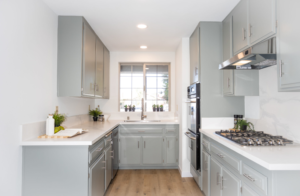If you’re reworking your kitchen, it’s crucial to make choices that will stand the test of time. Choose durable cabinets and countertop materials that withstand wear and tear, and look for energy-efficient appliances.

If your renovation will require dropping walls, moving gas lines, or rewiring electrical work, you’ll need state and county permits and licensed contractors. Contact Kitchen Renovation Houston for professional help.
A kitchen renovation begins with a careful evaluation of the existing layout. Depending on the space and its relationship to adjacent rooms, the layout can make or break the entire design and remodeling project.
When rearranging your kitchen, always consider how you and other family members will use it. It’s important to keep the main pathways clear and ensure that your work area is a reasonable distance from the stove, fridge and sink. Keeping these areas in mind can help you avoid common errors that complicate cooking and cleanup. For example, putting the sink too close to the oven or stove can obstruct your movements and may result in awkward positioning and poor ergonomics.
Another consideration when rearranging your kitchen is the size of the room. A large kitchen can support multiple workstations and a variety of storage solutions. Smaller rooms are more limited and often require creative planning. A large island can add functionality and a focal point to smaller spaces, while open shelving can add visual interest and extra storage.
Whether you’re working with a designer or on your own, preparing a list of your desired features will be extremely helpful during the design phase. It will also save time during the construction process by eliminating the back-and-forth between contractors.
Many cabinet manufacturers and retailers offer free design services. Utilizing this resource can help you achieve the look you want and stay within your budget. If you’re working with a design/build firm, it’s even more important to prepare a detailed scope of work. This will ensure that your contractor is providing you with a complete solution to your kitchen remodel needs. It will also prevent delays caused by long lead times for items like tile and custom cabinetry.
Cabinets
Cabinets are a big part of every kitchen. They store everything from cooking and baking ingredients to utensils, appliances and cookbooks. Choosing the right cabinets will allow you to organize and maximize your space and enhance your kitchen’s aesthetic, design and value.
You can find a vast array of cabinet styles, colors and materials to suit your design preferences, functional requirements and budget. To help you navigate these options, here is a rundown of some of today’s most popular cabinet materials and their benefits:
Solid wood cabinets are the top choice for many homeowners looking for a classic, timeless design that will not date or depreciate over time. They are rot-resistant and durable, offering superior strength and stability. They are also highly customizable with stain, paint and finish options that can complement or contrast your kitchen’s color scheme. However, solid woods are more expensive than other cabinet options and must be properly finished before they are brought into your home due to atmospheric changes that can warp unfinished surfaces.
Another popular option is reclaimed wood. Repurposed from old barns and buildings, this material is valued for its natural aging and rich patina. It is a sustainable option that reduces the need for new lumber and adds a warm, rustic look to any kitchen. Reclaimed wood is softer and can scratch or dent easier than other materials, but it can also be more durable with proper care.
If you’re on a tight budget, consider refacing your existing cabinets instead of replacing them entirely. A fresh coat of paint or a new stain can dramatically update the look of your entire kitchen and costs significantly less than replacement.
Countertops
Countertops are exposed to heat, sharp knives, and spills, so they need to be able to handle the daily wear and tear of an active kitchen. There are many different countertop materials to choose from, and each has its own advantages and disadvantages. You will want to consider your budget, durability, and aesthetic when making a choice.
Laminate countertops are a cost-effective option that offers a wide range of colors and patterns. They are durable and easy to clean, but are not as heat-resistant as other materials. Natural stone countertops add a timeless appeal to any kitchen. However, they are also more expensive than other materials and require regular sealing to protect them from stains.
Quartz and solid surface countertops are non-porous, so they resist bacteria and mold growth. They are also stain-resistant and require little maintenance, but they are not as heat-resistant as other materials.
Reclaimed wood is a sustainable and eco-friendly option that can add character to your kitchen. However, it is important to make sure that the wood you select has been sourced responsibly and is certified by an independent body such as the Forest Stewardship Council or GreenGuard.
Marble is a luxurious option that offers intricate looks, but it can be easily scratched and stained. Soapstone is a less expensive alternative that provides the look of marble with a muted color palette marked by subtle veining. These natural stones are sturdy and withstand heat, but they can be damaged by acids like vinegar.
Appliances
Appliances are a major selection in any kitchen remodel, the key decision point where practicality meets design and style. Choosing the right appliances will ensure that your renovated kitchen works seamlessly for you and your household. Investing in high-quality appliances also enhances the overall look and feel of your kitchen while saving money on utility bills in the long run.
Selecting the right appliances starts with defining your needs and lifestyle, which will inform which appliances will serve you best. A common mistake is buying appliances with features that aren’t needed. For example, purchasing a high-capacity dishwasher that you won’t use or an extra oven when you hardly ever bake wastes energy and money.
The next step is researching brands and models to compare quality, features, and cost. If you’re on a budget, mainstream appliances can be a great option, offering reliable performance and durable finishes. If you’re willing to spend more on a luxury brand, you can get top-of-the-line appliances with premium finishes that elevate your kitchen’s aesthetic.
When selecting appliances, consider the finish and color to match your kitchen’s décor. Stainless steel appliances are a timeless choice that complements any kitchen. Other options include a copper range, which is durable and develops a beautiful patina over time, and white appliances that can complement a wide variety of design styles.
Another important factor to consider is the installation timeline. If you’re hiring a professional contractor, they will need to install the appliances ahead of cabinet installation and plumbing fixtures. In the meantime, you should set up a temporary kitchen for cooking and eating. This includes a microwave and a small refrigerator to hold drinks, snacks, and leftovers.
Lighting
Often the most overlooked aspect of any room renovation, lighting can make or break the space’s look and feel. It is the foundation for all other fixtures and decor, offering a subtle radiance that complements a design scheme. A well-lit kitchen should consist of four important “layers”: task, ambient, accent, and decorative.
For the work area, overhead lights should illuminate the countertop and sink areas for food preparation and clean-up tasks. Recessed and track lighting are popular options for this purpose. Ambient lighting can be provided by chandeliers and pendants, or more functionally by a group of fixtures in the center of an open floor plan. In addition, sconces, torchieres, and strip and in-cabinet lighting are good options to consider for the ambient layer of the kitchen.
As the kitchen continues to evolve into a living/gathering space for homeowners, artwork has become increasingly prevalent in these spaces. Whitehead recommends recessed, adjustable fixtures to light these works of art and highlight their beauty.
For a more casual look, consider adding a series of pendants over the island or dining area. Other kitchen lighting ideas include sconces, uplights, and strips that can be placed on the ceiling or in cabinetry for an instant upgrade. Toe kick lights can also add a stylish, eye-catching touch to the underside of cabinets and the space between base cabinets and the floor for instant ambiance. A simple DIY project that can dramatically enhance a room’s ambiance is installing dimmer switches. These switches allow you to adjust the brightness of your kitchen fixtures and create the right mood for any occasion.

